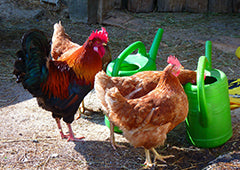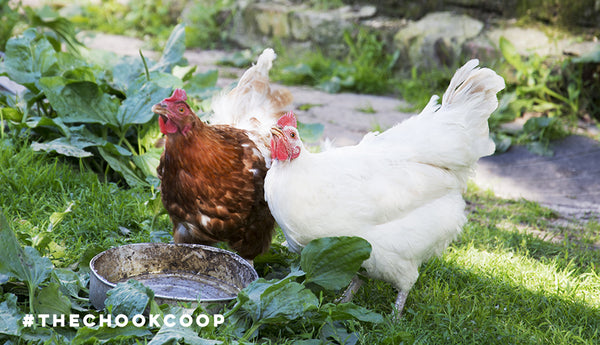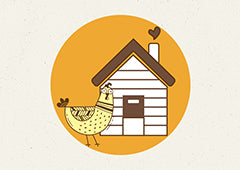Water is vital to a chicken’s health, so choose your chicken waterer wisely. Chickens must have access to clean fresh water at all times. It is essential that your chooks have plenty of water which enables your lovely backyard flock to grow properly, eat well and lay LOTS of eggs.
Just how much water does a chicken drink? It really doesn’t seem like much at all as they sip a little here, sip a little there, and go on about their business or their flock mate’s business. Typically though, a mature chicken will drink approximately .5 liters of water each day in temperate weather, even as much as a 1 full liter in warmer weather. If you have meat birds, they will visit the chicken waterer much more often than this, due to their fast growth rate. Free ranging chickens may drink more or less than this amount based on how busy they are exploring and foraging and how much water is in the plants and grass they eat. FYI, a chicken who is feeling a bit under the weather, may drink continually or drink nothing. This may mean refilling your chicken waterer twice a day or more. Be aware though, that chickens will stay as far away from drinking water that is tainted with an odor, perhaps from adding Apple Cider Vinegar, with droppings, feathers and straw, or debris. Also, stagnant water can produce slimy residue on the waterer and is the perfect environment for algae growth. So, with all of this in mind, let’s talk a little bit about cleaning your chicken waterer. About once a week, wash your chicken waterer with plain dish soap and water, then purify by wiping with a mixture of one part ordinary household vinegar to nine parts water.
Depending upon your climate, you may need to take additional precautions with your chicken waterer in the hot summers or during frosty cold winters. When the heat of summer strikes, there are a few things you can do to ensure that your chooks will have fresh, cool water always. Simply fill a few plastic cups, freeze them and place these magnificent mega-cubes in each chicken waterer, refill the water several times throughout the day, or offer your chickens beak-watering snacks such as watermelon, peaches, seedless grapes, berries, and rock melon in addition to their fresh water. In the blustery cold winter, there are several ways to prevent your chicken’s water from freezing-add a submersible heater, place the chicken waterer on top of a heated base, or use a heated dog bowl available at most hardware or farm supply stores.
When looking for a chicken waterer, consider how many chickens it will serve and perhaps it is a good idea to purchase a larger one. Chicken waterers are available in a variety of styles. One of the most commonplace waterers among backyard chicken keepers are Bell Waterers, which are available in plastic or metal, shaped like a bell, and have a rim around the bottom for your chickens to sip from. An Automatic Chicken Waterer connects directly to your outdoor water faucet or to the garden hose and will refill automatically as needed. Now that’s nice! Another type of chicken waterer which is becoming more popular and boasts cleaner water for your chickens, is the Nipple Waterer in which nipples are attached to either an automatic waterer or to a large 4 liter bucket with a lid. You will need to periodically inspect the nipples for possible clogs and if needed, rinse with warm water and reattach. A Gravity Flow Chicken Waterer, in which the water supply is stored in a nearby tank, is another choice if outdoor plumbing is not available or accessible. These systems can be quite complicated though.
So, do you want happy well-hydrated chooks? Then let the water flow! Cheers!
From waterers to chicken runs, there are plenty of things to consider when becoming a chicken parent. You deserve practical information to help you raise a happy, healthy flock. Many chicken keepers struggle to handle chicken health or behaviour issues, especially in the first few years of having a flock.
This is why I recommend Chickenpedia to all my readers. They have comprehensive online courses on everything you didn’t know you need to know and then some more! From healthcare to raising baby chicks to feeding and behavior, you’ll find beginner-friendly courses that’ll give you the knowledge and confidence to successfully look after your chickens.
As a member, you will get access to ALL their fantastic courses. No need to wing it, become the ultimate chicken eggspert! Check out Chickenpedia today!


















